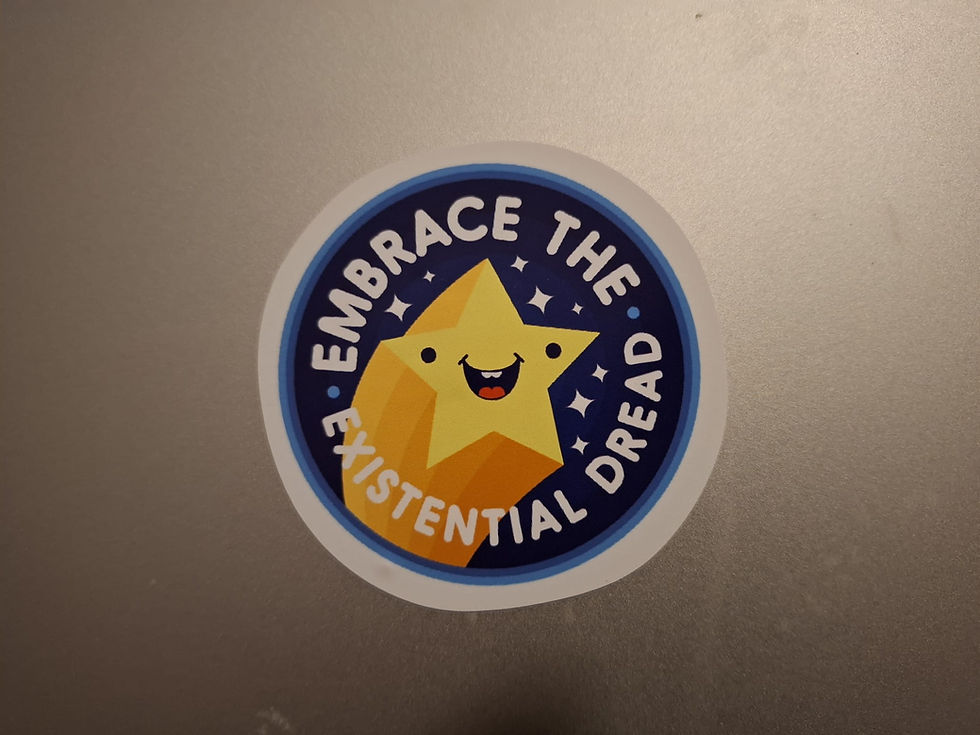Embrace the existential dread (blog)
- Vivienne Matthies-Boon

- Jun 17, 2025
- 3 min read

One of my colleagues in the Department gave me this sticker today. He had bought each of us a sticker that belongs or says something about us. So kind. And so true. He got it so spot on.
Because if there is anything that #LongCovid taught me, it is the violence of fading out our vulnerability, our fragility, in the name of (hyper) individualism. Of course, I have already highlighted (in Dutch) my critique of individual responsibility (see here).
But it all goes a lot deeper than that. Our existential worldview, the symbolic order of the lifeworld constantly emphasises individual strength, and a politics of becoming. Only if we create, if we make, if we produce, do we fully develop into our (supposedly authentic) being, into our self. Indeed, the whole history of Western (and yes, I am being Westocentric here for a moment) philosophy emphasises the manifestation of the self in one way or another. It is the pinnacle not just of our neoliberal societies, but also of our conceptual thinking, of our conceptual history. Even the alternatives, the critiques of neoliberalism, of the market, of the current political order, emphasize becoming, creating, producing, emancipating, doing.
Yet, what happens when you cannot manifest? What happens when you cannot do, you cannot make, you cannot produce, can you be? What happens when self-manifestation ceases in its entirety? Philosophy has very little to say to the totally incapacitated - to those who are in a semi -vegetative state not for one hour, not for days, but for months or even years on end – with no end in sight. No prediction. No timeline. Postinfectious disease. Living death. Pacing. Crashing. In that state there is no possibility of a Heideggerian projecting forward of the self, rather it is pure subjection. It crashes the illusion of the creating, powerful, manifesting and doing will. It exposes the fact that our will is dependent upon the body as its precondition.
In that state, time is no longer experienced in terms of a flow of experiences, impressions. Time became endless and at the same time shorter. Months seemed like an eternity, but also a second. No content. Just lying and the painful misery of being. No more dreams, often metaphorically but also quite literally as there was no sensory input. Dreams literally stopped.
I was lucky, I "only" experienced this state for 6 months in the course of a 1,5 year housebound state before medication picked me out of this hole and put me on my feet again. Dependence on and gratitude for medication, also put the medicalization critique in a different light. Not all of that critique is wrong, but there is a certain privilege in that critique that the chronically ill cannot afford.
I was lucky. Not only in finding the right doctor who prescribed the right medicine that worked, but also in having an employer that allowed me time to get on my feet again. And that as I was on my feet again embraced my state and enabled me to grow further – even promoted me to Head of Department. There is a sensitivity in that for which I have more than one colleague to thank. Pure being became becoming again.
But it became becoming in a different way. Becoming with a mask on (FFP2, in public spaces, every day), and a mask off. Living death relativises. It throws the structures of life in a different order. It forces you to let go of illusions of strength and internalized ideas of self-resilience and the values attached to that. Indeed, it shines a different light on attachment as such. No longer attaching through painful projections forward (of how things ought to be) or backwards (this is how they were), but rather a deep fundamental pragmatism, a being here and now. And in that space, a different sense of space, of creativity, is born (after the medical intervention). Not one of anxious projection, but out of embracing the existential dread.
